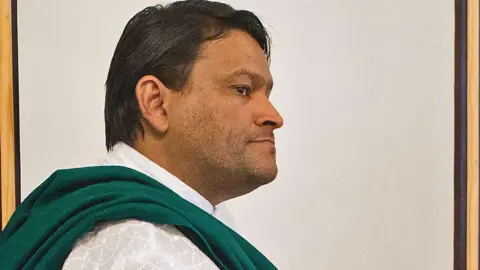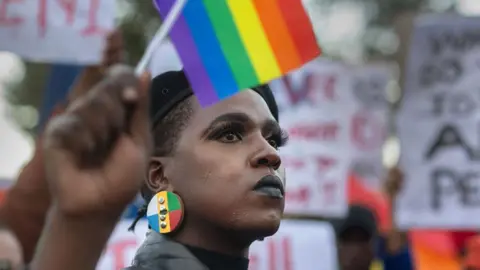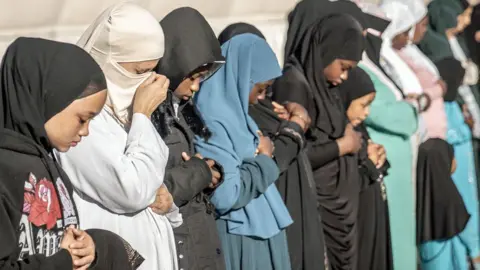Even in his final seconds of life, first gay imam pushed boundaries
 AFP
AFPThe execution-style killing of an openly gay imam, Muhsin Hendricks, in South Africa has left people in the LGBTQ+ community fearful for their safety - but also determined to forge ahead with the campaign to end their marginalisation in religious circles.
Reverend Toni Kruger-Ayebazibwe, an openly gay Christian cleric, told the BBC that Hendricks was a "gentle spirit" who brought light into any room he occupied.
"The gap Muhsin leaves is massive," she said, adding that she knew for a fact that there were "a large number of queer Muslims around the world who are grief stricken".
The 57-year-old was shot dead in what appeared to be a hit on Saturday in the small coastal city of Gqeberha.
Initial reports that Cape Town-based Hendricks had been in Gqeberha to perform the wedding ceremony of a gay couple have been dismissed as untrue by his Al-Gurbaah Foundation.
"He was visiting Gqeberha to officiate the marriages of two interfaith heterosexual couples when he was tragically shot and killed," it said in a statement.
It is unclear why the couples had asked Hendricks to oversee their ceremonies, but it suggests that he was pushing the boundaries, even in the last seconds of his life.
Traditional imams in South Africa rarely, if ever, perform the marriage of a Muslim to a non-Muslim - something that Hendricks clearly had no issue with.
He had, according to a faith leader that the BBC spoke to, conducted one such marriage ceremony and was on his way to conduct the next one when he was gunned down in his vehicle.
 AFP
AFPTwo leading bodies that represent imams - the Muslim Judicial Council (MJC) and the United Ulama Council of South Africa (UUCSA) - condemned Hendricks' killing.
"As members of a democratic, pluralistic society, the MJC remains steadfast in advocating for peaceful coexistence and mutual respect, even amidst divergent views," the MJC said, while the UUCSA said it condemned "all forms of extra-judicial killings".
However, Hendricks - who did his Islamic studies in Pakistan - was a pariah in their circles, as they hold the view that Islam prohibits same-sex relations.
They pointedly referred to him as "Mr Hendricks", rather than by religious titles like imam or sheikh.
In contrast, Hendricks' supporters hailed him as the world's first openly gay imam who made it possible for them to reconcile their sexuality with their Islamic faith.
That he was a trail-blazer is not surprising - South Africa's constitution, adopted in 1996 after the end of white-minority rule, was the first in the world to protect people from discrimination because of their sexual orientation.
Then in 2006, South Africa became the first country in Africa to legalise same-sex marriage.
Once in a heterosexual marriage with children, Hendricks came out as gay in 1996 - and, according to The Conversation, he later broke another taboo by marrying a Hindu man.
He then spearheaded the formation of The Inner Circle as "an underground social and support group" for queer Muslims.
It started out at his home in Cape Town, and has "proven to be very successful in helping Muslims who are queer to reconcile Islam with their sexuality", The Inner Circle's website says.
Despite South Africa having a thriving LGBTQ+ scene, members of the community still face some stigmatisation and violence.
 AFP
AFPOnly a few of the country's religious groups have adopted policies that are more favourable towards the community, among them the Dutch Reformed Church and the Methodist Church of Southern Africa.
The Dutch Reformed Church was in 2019 forced by the courts to reinstate a policy it had introduced four years earlier, but then scrapped, allowing same-sex marriages and for gay and lesbian pastors to be in romantic relationships.
The following year, the Methodist Church said that while it was "not yet ready to apply for its ministers to officiate at same-sex marriages", no congregant residing in a member country that recognised civil unions would be "prevented from entering into such a union which can be as same-sex or opposite sex couples".
Reverend Ecclesia de Lange, the director at Inclusive and Affirming Ministries (IAM), told the BBC that even in instances where faith groups had adopted inclusive policies there were still "pockets of very strong conservatism".
"The traditional interpretations of sacred texts continue to exclude LGBTQ+ people, so the struggle for acceptance within faith communities remains ongoing," she said.
Senior lecturer in Islamic Studies at South Africa's University of the Western Cape, Dr Fatima Essop, reflected on the "distressing" vitriolic content circulating on social media in the wake of Hendricks' killing.
"I just find that completely shocking and so far removed from our... Islamic tradition, which is all about compassion and mercy and preservation of human life," she told the BBC.
Dr Essop added that while she understood some of the strong feelings against Hendricks' work, there was "absolutely no justification, Islamic or otherwise, for this kind of violence".
And while the motive is unclear, Hendricks' killing - and the negative comments that followed - was likely to make people fearful to "speak about their sexuality or sexual orientation", Dr Essop said.
Reverend Kruger-Ayebazibwe said that while Hendricks' shooting would make LGBTQ+ leaders rethink their security, it would not deter them from campaigning for change "because the work matters too much".
Hendricks has already been buried at a private ceremony, though his Al-Gurbaah Foundation has pledged to organise a memorial in the near future to "honour his immense contributions".
For Teboho Klaas, the religion programme officer at The Other Foundation, which champions LGBTQ+ rights in southern Africa, his killers may have cut his life short "but not his legacy because he has multiplied himself".
You may be interested in:
 Getty Images/BBC
Getty Images/BBCGo to BBCAfrica.com for more news from the African continent.
Follow us on Twitter @BBCAfrica, on Facebook at BBC Africa or on Instagram at bbcafrica
